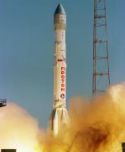Excess propellant cause of Proton launch failure
Posted: Tue, Dec 31, 2002, 7:17 PM ET (0017 GMT)
 An excess of propellant in an engine is the likely cause of the failure of a Proton launch last month, International Launch Services (ILS) announced Tuesday. ILS said that the preliminary conclusion of a Russian commission looking into the November 26 launch failure was that an excess of propellant in the main engine of the Block DM upper stage caused an explosion at the beginning of its second burn. The explosion caused the payload, the Astra 1K spacecraft, to separate while still in a low transfer orbit. The spacecraft was deorbited earlier in the month. The Proton K vehicle itself played no role in the failure, the commission found. The commission continues to investigate the failure and is expected to issue a final report next month. ILS has its own failure review oversight board that will review the commission's report and issue its own recommendations. The Block DM stage has made one successful flight since the failure with the successful launch of three Glonass navigation satellites on December 25.
An excess of propellant in an engine is the likely cause of the failure of a Proton launch last month, International Launch Services (ILS) announced Tuesday. ILS said that the preliminary conclusion of a Russian commission looking into the November 26 launch failure was that an excess of propellant in the main engine of the Block DM upper stage caused an explosion at the beginning of its second burn. The explosion caused the payload, the Astra 1K spacecraft, to separate while still in a low transfer orbit. The spacecraft was deorbited earlier in the month. The Proton K vehicle itself played no role in the failure, the commission found. The commission continues to investigate the failure and is expected to issue a final report next month. ILS has its own failure review oversight board that will review the commission's report and issue its own recommendations. The Block DM stage has made one successful flight since the failure with the successful launch of three Glonass navigation satellites on December 25.
 An excess of propellant in an engine is the likely cause of the failure of a Proton launch last month, International Launch Services (ILS) announced Tuesday. ILS said that the preliminary conclusion of a Russian commission looking into the November 26 launch failure was that an excess of propellant in the main engine of the Block DM upper stage caused an explosion at the beginning of its second burn. The explosion caused the payload, the Astra 1K spacecraft, to separate while still in a low transfer orbit. The spacecraft was deorbited earlier in the month. The Proton K vehicle itself played no role in the failure, the commission found. The commission continues to investigate the failure and is expected to issue a final report next month. ILS has its own failure review oversight board that will review the commission's report and issue its own recommendations. The Block DM stage has made one successful flight since the failure with the successful launch of three Glonass navigation satellites on December 25.
An excess of propellant in an engine is the likely cause of the failure of a Proton launch last month, International Launch Services (ILS) announced Tuesday. ILS said that the preliminary conclusion of a Russian commission looking into the November 26 launch failure was that an excess of propellant in the main engine of the Block DM upper stage caused an explosion at the beginning of its second burn. The explosion caused the payload, the Astra 1K spacecraft, to separate while still in a low transfer orbit. The spacecraft was deorbited earlier in the month. The Proton K vehicle itself played no role in the failure, the commission found. The commission continues to investigate the failure and is expected to issue a final report next month. ILS has its own failure review oversight board that will review the commission's report and issue its own recommendations. The Block DM stage has made one successful flight since the failure with the successful launch of three Glonass navigation satellites on December 25.
Related Links:
| <<previous article | next article>> |
|
news in brief
|
|
|
|
news links
|
|
Monday, March 2
Firefly Scrubs Alpha Rocket Launch Attempt Due to Winds
Noozhawk — 6:28 am ET (1128 GMT) Space, 6G and AI: How Europe aims to be at the forefront of global communications with €100mil fund
EuroNews — 6:28 am ET (1128 GMT) SpaceX launches 29 Starlink satellites on Falcon 9 rocket from Cape Canaveral
Spaceflight Now — 6:26 am ET (1126 GMT) US far behind in space defense, True Anomaly CEO warns
Business Insider — 6:25 am ET (1125 GMT) Apollo-era space colony dreams inspire Musk’s moon transport plan
The Hill — 6:22 am ET (1122 GMT) |